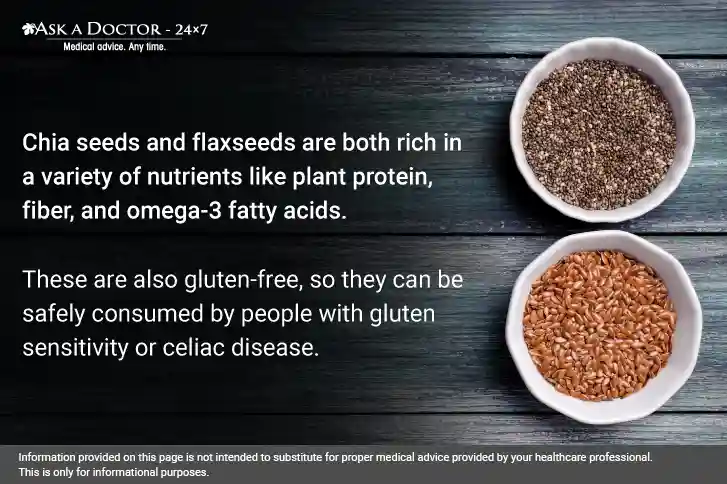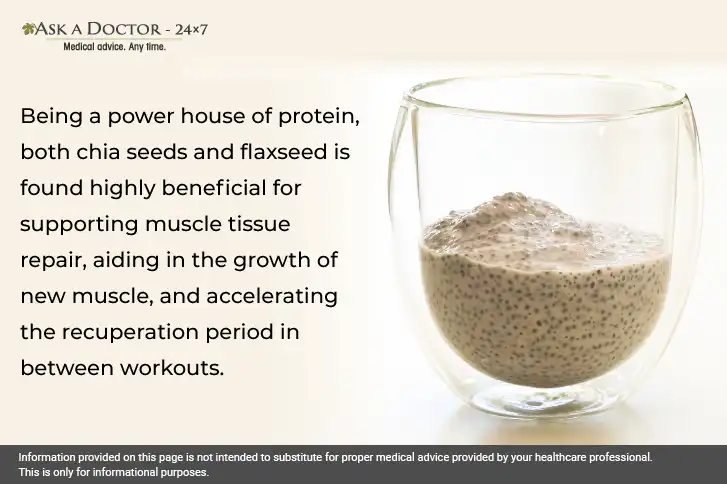Chia Seeds Or Flaxseeds: Which Is Better?
When it comes to including healthy food choices in your diet, both chia and flax seeds are highly versatile and simple to include in your meal. These two nutritious powerhouses can be a common addition to cereals, salad dressings, dairy, and smoothies due to their various health advantages.
These two seeds are not only adaptable superfoods that can be eaten year-round but are also nutrient-dense seeds. These seeds provide important antioxidants, fiber, minerals, and omega-3 fatty acids. Regularly consuming chia and flaxseed can aid in weight loss, lower the risk of heart disease, control blood sugar levels, and have cancer-fighting properties. Keep reading to learn about the health advantages of these potent seeds and find out what the hype is all about.
Common Health Benefits of Chia and Flaxseed

Chia seeds and flax seeds nutrition allows for their many uses and benefits, which include:
- An excellent supply of omega-3 fatty acids: Omega-3 fats improve your health by assisting in reducing inflammation, which otherwise has the potential to cause disease. The omega-3 found in both chia and flaxseed is called alpha-linolenic acid (ALA). Although fish and other animal foods provide the majority of omega-3 fats, these seeds are among the best plant sources of these vital fats.
- Rich in antioxidants: These seeds are quite high in antioxidants. Consuming antioxidant-rich foods helps shield our cells from disease-causing free radicals. Thus, regularly consuming chia and flax seeds can help in the prevention of diseases.
- Filled with fiber: Almost 80% of the carbohydrates found in these seeds are in the form of fiber. Fiber acts as a prebiotic that helps feed the good bacteria in your stomach, promoting a healthy digestive system and warding off digestive illnesses including irritable bowel syndrome and constipation. It also aids in weight control by extending the feeling of fullness.
- Source of plant-based protein: As we know, proteins are the building blocks of the body. Those who consume just vegetarian or vegan food may find these seeds to be a beneficial source of protein.
- Improve heart health: Both chia and flaxseed improve heart health by lowering cholesterol and blood pressure levels along with reducing inflammation.
- Stabilize blood sugar: High-fiber content in these seeds prevents blood sugar spikes and helps in managing insulin levels and diabetes.
- Helps in weight loss: Both flaxseed and chia seeds are good for gut health and effective at controlling appetite, which aids in weight loss.
- Cancer-fighting properties: Both these seeds have anti-cancer properties that reduce the growth of cancer cells in breast, colon, cervical, and prostate cancer.
Chia Seeds and Flaxseed: Nutritional Comparison
Flaxseeds and chia seeds have more similarities than differences. Here’s a rundown of chia seeds versus flax seeds nutrition:
Chia Seed (2 tablespoons):
- Calorie: 140 calories
- Flavor: Bland in taste (neutral flavor)
- Appearance: Small, round, and flat seeds of black and white color
- Fiber: 11 grams (higher in fiber as compared to flaxseed)
- Unsaturated fat: 7 gram
- Protein: 4.4 gram
- Minerals: Calcium, copper, magnesium, zinc, iron, and potassium
- Good source of calcium and iron
- It has more vitamin A than flaxseed.
- Chia seeds are 19% protein and are deemed as complete protein as they contain all nine essential amino acids.
- Best way to consume: Soaking in water or milk (chia pudding) is preferred which creates a gel-like final product.
Flaxseed (2 tablespoons):
- Calorie: 78 calories
- Flavor: Nutty flavor
- Appearance: Oval-shaped seeds, brown or golden in color
- Fiber: 4.2 gram (Has more soluble fiber as compared to chia seed)
- Unsaturated fat: 6.3 gram
- Protein: 2.76 gram
- Minerals: Magnesium, zinc, copper, iron, and folate
- Have a minimum amount of calcium and 40% less iron than flaxseed.
- It has more potassium than chia seeds.
- Vitamin A is present in insignificant amounts.
- Flax seeds are made up of 18% protein with their amino acid profile comparable to soybeans. They lack in amino acid lysine therefore considered incomplete proteins.
- Best way to consume: Ground before consumption to enhance digestibility and nutrient absorption.
Who Should Avoid Chia or Flaxseeds?
The majority of people can safely consume both chia and flaxseeds, as they usually don't have any negative side effects. However, consult your physician before consuming them in the following cases:
- If you are sensitive to fiber, you may experience digestive issues due to the high fiber content of these seeds.
- Increase bleeding risk in people who have bleeding disorders or take blood thinners.
- Allergic to seeds. One should stop eating them and consult a doctor if you notice any signs of an allergic reaction.
- Pregnant or breastfeeding mother. It has mild hormonal effects (acts like estrogen) and can increase the chance of premature birth.
- Avoided in patients with gastrointestinal obstruction
Ways You Can Include Flaxseed and Chia seeds to Your Diet

You can incorporate the two seeds into your diet in the following ways:
- Add in your yogurt.
- Make chia seed milk pudding or custard.
- Add to overnight oats, cold cereal, or hot cereal.
- In baked items, ground flaxseeds, and chia seeds can be used as an egg substitute.
- Add to granola bar recipe.
- Stir into baked items. Use ground flaxseeds with your flour when preparing muffins or cakes.
- Mix into shakes or swirl into your juice.
- Add a pinch to toast with nut butter or avocado.
- Use in homemade jam.
In conclusion, both flaxseed and chia seeds are quite versatile, and healthful, and have a lot to offer in terms of composition. They supply alpha-linolenic acid, fiber, and protein and provide similar benefits like better digestion, bone health, weight loss, lower blood sugar, and heart health. One is not substantially healthier than the other, despite minor differences in some nutritional levels and advantages. To reap more health benefits from these seeds, consult your doctor before incorporating them into your diet.
If you have any questions about the benefits or side effects of chia seed and flaxseed, you can Ask a Nutritionist/Dietician at Ask a doctor, 24x7.
Recently Answered Questions Related to Seeds, Nuts, and Their Nutritional Benefits
- Suffering From Hypertension. Can I Consume Chia Seeds And Flax Seeds Daily?
- Could I Have Brown Rice And Chia Seeds Regularly?
- Would Having Chia Seeds Cause Itching Around Eyes And Mouth?
- Does Chia Seeds Increase The Risk Of Prostate Cancer?
- Is It Good To Drink Chia Seeds During Pregnancy?
- Are Flax Seeds And Warfarin Compatible?
- Are Fish Oil, Chia, Flax, And CoQ10 One Supplement Everyday Healthy?
- Can Heart Medication And Flax Seeds Be Taken Together?
- What Should Be Done After Excessive Consumption Of Flax Seeds?
- How Much Flax Seeds Can Be Consumed Daily?
Disclaimer: Information provided on this page is not intended to substitute for proper medical advice provided by your healthcare professional. This is only for informational purposes.
Ask a Specialist
Recent Questions


